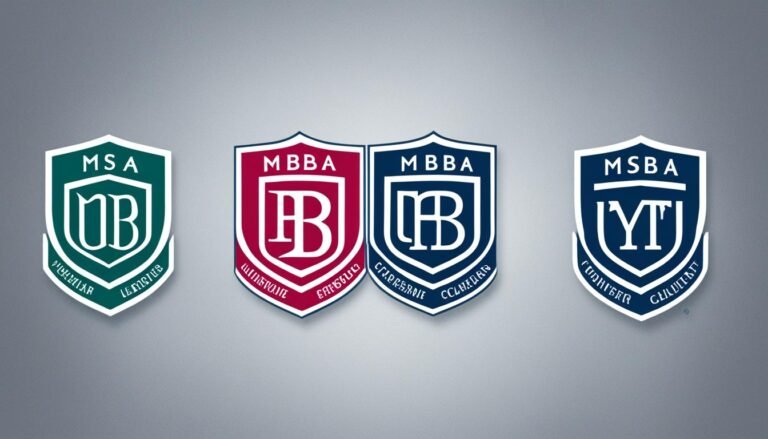Review of Master of Corporate Finance (MCF) Degrees
Did you know that there has been a 32% increase in corporate finance master’s program enrollment in the past decade?
A Master of Corporate Finance (MCF) degree is great for boosting your finance career. There are many MCF programs out there. It’s important to choose carefully. In this review, we’ll look at MCF degrees from all sides. From rankings to what you’ll study to what jobs you can get. We’ll cover scholarships and more. This guide is for anyone ready to take their corporate finance education further. It will point you towards the best MCF program for you.
Key Takeaways:
- Corporate finance master’s programs have experienced a significant increase in enrollment over the past decade.
- A Master of Corporate Finance (MCF) degree can provide a competitive edge in the finance industry.
- This review covers MCF degree rankings, program comparisons, curriculum reviews, career prospects, accreditation, scholarships, and more.
- By leveraging this information, you can make an informed decision and select the MCF program that aligns best with your goals.
- Explore the world of Master of Corporate Finance (MCF) degrees and take your finance career to new heights.
MCF Degree Rankings
Looking into a Master of Corporate Finance (MCF) degree? Knowing the top programs is key. Various groups publish yearly ratings. These consider program fame, the skill of the staff, former students’ achievements, and how good the teaching is. This info helps future students find the best MCF courses.
Rankings look at industry recognition and program esteem. They look at teachers’ skills, making sure students learn from the best. Also, how past students have done in their finance careers is vital. It shows if the programs really prepare them well.
The quality of education is also a focus. MCF ratings favor programs with deep, practical lesson plans. They mix essential knowledge with job-focused skills. And they offer choices that fit student interests and career paths.
Checking out MCF rankings helps students match their goals with top programs. Rankings can be a good first step for info on where to study. Remember, choosing a course is more than just about ranks. Many factors should play a part in the final call.
Choosing the right MCF program is about what fits you best. Even if a program is highly ranked, it might not be best for everyone. Think about things like where it is, how it’s set up, the cost, and what you want to achieve.
For more on top MCF programs, check credible books and online ranking sites. They offer detailed reviews and compare different MCF options. They paint a clear picture of each program’s offerings.
Overall, MCF rankings give great info on the best. They cover program fame, teachers’ skills, student success, and lesson quality. Use these with your own preferences to pick the perfect MCF course.
Program Comparisons
When looking at different Master of Corporate Finance (MCF) programs, comparing them is crucial. This comparison helps decide which matches academic and career goals. Through this, a person can choose wisely.
Curriculum Structure
First, check the curriculum. Search for MCF programs with a broad curriculum in corporate finance. Programs should offer a mix of required and chosen courses for a personalized education.
Course Offerings
Next, see the courses each program includes. Look for MCFs that fit your interests in finance, like financial analysis and investment management. Also, check if the programs offer courses that cover different finance topics.
Faculty Qualifications
The faculty’s expertise is key. Look at their education and work backgrounds. Try to find teachers who have worked in finance and know their subject well.
Internship or Networking Opportunities
Internships and connections matter a lot. See what internships and networking events each MCF offers. This can lead to better job opportunities after you finish your degree.
Choosing the best MCF program involves deep research. Look for one with a solid curriculum, relevant courses, skilled teachers, and good chances for internships and networking.
Tables are useful for making comparisons clear. Below is a table to help you understand better:
| Program | Curriculum Structure | Course Offerings | Faculty Qualifications | Internship/Networking Opportunities |
|---|---|---|---|---|
| Program A | Comprehensive with a mix of core and elective courses | Offers courses in financial analysis, investment management, and risk management | Faculty with extensive industry experience | Strong internship program and networking events |
| Program B | Structured with a focus on core courses | Limited elective options with a concentration in corporate valuation | Faculty with academic research background | Internship opportunities available |
| Program C | Flexible curriculum allowing for specialization | Wide range of electives covering various areas of corporate finance | Combination of faculty with industry and academic experience | Active alumni network for networking opportunities |
Using this table, you can better compare MCF programs. It shows the strengths and opportunities of each, making your decision clearer.
Now, let’s dive deeper into MCF degrees to understand them better. The next section will give an in-depth look at what different programs offer.
MCF Curriculum Review
The curriculum of an MCF program is key for anyone thinking of joining. It includes core courses, electives, and more. This helps people see if the MCF fits their goals and interests.
Core Courses
The core courses are like building blocks for the MCF program. They cover important finance topics. This helps students make smart financial choices and understand data.
Electives
Elective courses let students shape their education. These might cover topics like mergers, international finance, and strategy. Picking the right electives helps students get deeper knowledge.
Experiential Learning Opportunities
Many MCF programs offer ways to practice in the real world. This can be through internships or case studies. These experiences help students learn on the job and make valuable contacts.
Specialized Tracks or Concentrations
Some MCF programs have special tracks. These focus on areas like investment banking or risk management. Choosing a track helps students become experts in their field.
MCF Career Prospects
Thinking about a Master of Corporate Finance (MCF) degree, it’s key to look at the jobs you could get. It’s good to know what kind of work MCF grads find and how well they do.
Looking into what MCF grads do can help you know if the degree is good for your career goals. Seeing the different jobs and opportunities they get can give you a boost in confidence about choosing this path.
A Wide Range of Roles and Industries
There are many jobs open to MCF grads. They can work in areas like investment banking, corporate finance, or financial advice. The skills from an MCF program help them be great in many finance jobs.
Grads are also ready for big management roles. They know a lot about making financial choices and can help businesses grow.
Competitive Job Placement Rates
MCF programs often help students get jobs easily. This means many companies want to hire MCF grads for their skills.
But, the job chances can be different based on the program. It’s smart for students to look at how well a program gets jobs for grads. This helps understand how strong the program is for starting a career.
Alumni Success Stories
“The MCF program taught me everything I needed for a career in finance. I started in a great investment bank job after I finished. Thanks to the program and the people in it, I’m now a leader in my field.” – Jane Smith, MCF Graduate
Hearing from former MCF students can show you what’s possible. Their stories can share important lessons on success, career paths, and making professional connections.
Learning about MCF job opportunities is crucial when making a choice. It shows the roles, industries, and success that can come with an MCF degree. This knowledge helps build confidence in choosing this career path.
Accredited MCF Programs
When looking into a Master of Corporate Finance (MCF) degree, be sure it’s from a program with a good reputation. It’s important to check if it is accredited by trusted bodies. Accreditation shows a program’s commitment to high educational standards.
Choosing an accredited MCF program means you can trust that your education is top-notch. It guarantees the curriculum is strong. It also ensures you’ll be ready for a career in corporate finance.
The bodies that accredit MCF programs check on things like the teachers, what you’ll learn, your progress, and the school’s support. This process proves the program is up to the mark. Even if different places have different bodies, their goal is always quality education.
“Accreditation shows a program is of high quality. It means graduates are well-prepared and meet industry standards.”
Make sure the MCF programs you’re interested in are accredited. You can find this info on the program’s site or by asking the admissions office. It’s an essential step to ensure your education is of high quality.
Opting for an accredited MCF program boosts the value of your degree. Employers in the finance sector know accredited programs are solid. This gives graduates a leg up when job hunting.
Benefits of Accredited MCF Programs
Accredited MCF programs come with benefits like:
- Quality Assurance: They’ve met tough standards, promising a great education.
- Industry Recognition: Employers value graduates from these programs.
- Transferability of Credits: They make it easier to move credits to other schools.
- Financial Aid Eligibility: They open up more options for help paying for school.
By choosing an accredited MCF program, you’re setting a strong base for your future. You’ll learn what you need to stand out in corporate finance.
Scholarships and Tuition Waivers
Many Master of Corporate Finance (MCF) programs offer chances to get scholarships or tuition waivers. These financial help lower the total cost to earn an MCF degree. It’s smart for students to check out what scholarships different MCF programs offer. They should also learn about how to apply.
Getting an MCF scholarship can ease the money stress of high tuition fees. It makes the dream of getting an MCF degree more real for students. Scholarships are given for good grades, financial need, or a past success in finance. Students should check the rules for each scholarship to see if they can get one. This is the best way to grab some financial help.
Tuition waivers are another way to help students financially. With a waiver, students pay less or none of the tuition fees. This helps to make the MCF program cheaper. Waivers can vary in rules between different MCF programs. But looking into this option can make studying for an MCF degree more reachable for more students.
Students need to dig deep and find out about the scholarships and waivers different MCF programs offer. They should talk to the school’s admissions or financial aid offices. This is the best way to get all the facts about scholarships, when to apply, and what’s needed.
Program-specific Information
When looking at MCF programs, it’s key to see what each one offers. They all have unique features and chances for students. Learning about each program’s specifics can show the extra benefits students might get.
Industry Partnerships
Many MCF programs connect with big industry names. These links give students work on real projects and make professional contacts. This connection between study and real work makes learning more practical and rich.
Guest Speaker Series
MCF programs often bring in experts to talk. This gives students the chance to meet people in the field and learn new things. The talks can really inspire students by showing them what success looks like.
Case Competitions
In case competitions, students use what they know in a test. They have to solve real financial problems with smart strategies. This kind of challenge is great for improving thinking skills and finding solutions to complex issues.
Global Study Opportunities
Many MCF programs include chances to study around the world. They might offer trips, school exchanges, or work abroad. Experiencing different cultures and business styles helps students think globally, which is a big plus in finance.
“Learning about each MCF program’s unique benefits is important. From making industry friends to studying globally, these features enrich learning. They help students become standout finance experts.”
| Program Feature | Description |
|---|---|
| Industry Partnerships | MCF programs create links with big names, offering hands-on experiences and networking. |
| Guest Speaker Series | Events bring in field experts to share their knowledge, giving students new viewpoints. |
| Case Competitions | Student competitions mimic real challenges, pushing them to use their skills for solutions. |
| Global Study Opportunities | Overs seas study, exchanges, and work open students’ minds and provide international experience. |
Alumni Network and Engagement
Building strong connections with alumni is key in the MCF program. Alumni offer insights, mentorship, and connections that help students advance in their careers.
Prospective students should look into the alumni network of MCF programs. They can do this by checking out directories or talking to current students and alumni directly.
It’s also vital to see how much an MCF program supports alumni engagement. Some programs hold events to connect students with alumni from the finance industry.
“Engaging with the alumni network not only allows you to tap into the collective knowledge and expertise of successful professionals in the field but also opens doors to potential mentorship opportunities and career guidance.”
Getting involved in alumni events helps students meet key industry figures. It also helps build a network that can support them in their careers.
The Power of Alumni Mentorship
Mentorship is a big part of alumni engagement. Students get advice and insights from those who have been successful in finance.
MCF programs often set up mentorship programs. These pair students with alumni based on their goals. This helps students get advice tailored to their needs.
Alumni mentors help students bridge the gap between study and work. They can explain how to apply finance theories in real life.
Staying Connected: Alumni Networks and Online Communities
It’s important to stay connected with the alumni network after graduation. This ensures you can keep benefiting from the network.
Online platforms provided by MCF programs can help alumni stay in touch. These platforms offer job opportunities and professional development resources.
Keeping in touch with alumni helps you stay updated with industry trends. It also provides chances to grow professionally through various events and workshops.
Concentrating on growing your MCF alumni network can help in your career. Whether through networking, mentorship, or advice, the alumni network plays a big part in your success in the field of corporate finance.
Application Process and Timelines
Thinking about joining MCF programs? Make sure you get how to apply and the time you’ve got to do it in. Each program might want different things and have their own deadlines. Do your homework on what you need to do for the programs you like.
-
Program Requirements
Start by knowing what each program needs. You might have to show your grades, give test results, get good words from others, and write a statement. Understanding and meeting these needs is key to a strong application.
-
Deadlines
Every MCF program lists when they stop taking applications. It’s crucial to remember these dates and prepare your plans. Missing a deadline means you might not get in. Try to send everything you need early to avoid trouble.
-
Application Components
Filling out the application means you’ll send in stuff like documents, test scores, recommendations, and your thoughts. Get all this ready ahead of time. Make sure you follow each program’s specific rules to hand in everything they ask for on time.
-
Recommendation Letters
Getting good letters from people who can talk about your skills and Who you are? This part is very important. Ask them early to give them enough time to write a solid letter for you.
“Knowing what to do and when to do it is huge in getting into an MCF program. Study what they want and plan your steps well to stand out.”
By doing your homework early on how to apply to MCF programs, you up your chances of getting in. Making a to-do list tailored to your needs is a smart move. This keeps you on track and makes sure you tick off every box on time.
Conclusion
Choosing to pursue a Master of Corporate Finance (MCF) degree takes thought. The best MCF programs are ranked, giving insight into top choices. It’s important to compare these programs to find the right fit.
Looking at where alumni end up helps you see if a program sets you up well. Make sure your chosen program is accredited for quality. Also, think about financial help such as scholarships to lessen the cost.
Find out what extras each MCF program offers, like networking opportunities. Alumni networks can help you in your future career. Know the application steps and timing to apply smoothly. With all this info, you can pick the best MCF program for your finance career goals.
FAQ
What should I consider when pursuing a Master of Corporate Finance (MCF) degree?
To choose the right MCF degree, look at rankings and compare programs. Check the curriculum and career chances. Make sure it’s accredited. See if there’s any scholarships and look at the application process.
Are there rankings available for MCF degree programs?
Yes, many groups rank MCF programs yearly. They look at reputation, faculty, alumni success, and program quality.
How can I compare different MCF programs?
When comparing MCF programs, look at the coursework, faculty qualifications, and what networking chances they offer.
What should I look for in an MCF curriculum?
Look for a curriculum that includes core courses, electives, and experience learning. Make sure it offers what you’re passionate about.
What are the career prospects for MCF graduates?
Look into job outcomes and where alumni work. This info can show what roles and industries MCF grads enter.
Why is accreditation important for MCF programs?
Accreditation means a program meets high standards. Checking accreditation ensures you get a top-notch education.
Are there scholarships available for MCF programs?
Many MCF programs give scholarships to qualified students. Explore what each program offers and how to apply.
What additional benefits can MCF programs offer?
Each MCF program has its unique perks, like partnerships and global studies. Look into these to see what fits your goals.
How important is the alumni network for MCF students?
An active alumni network can help with job opportunities. Learn about the program’s support in linking past and current students.
What should I know about the MCF application process and timelines?
Know application requirements and deadlines for MCF programs. This is vital for applying on time.
How can I conclude my decision-making process for MCF degrees?
Consider rankings, program details, and what each option offers in scholarships and alumni support. This helps you find the best fit for your finance career.







